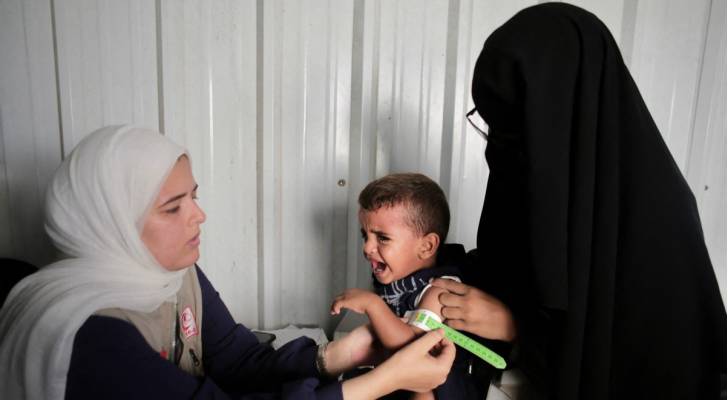A Palestinian child gets a check up at a medical point run by a local NGO (Credit: AFP)
Study reveals widespread drug-resistant bacterial infections in Gaza
A new analysis has revealed a high prevalence of antibiotic-resistant infections across Gaza, highlighting the growing public health crisis amid 'Israel’s' war and blockade of the territory.
Published Tuesday in the peer-reviewed medical journal The Lancet, the study examined 1,300 specimens collected at al-Ahli Hospital in Gaza City between November 2023 and August 2024. Researchers defined multidrug-resistant bacteria as those impervious to at least one drug in three or more classes of antibiotics.
The analysis found that 66.9 percent of samples were multidrug resistant, with bacteria showing resistance to antibiotics including amoxicillin-clavulanate, cefuroxime, and cefotaxime. Resistance to ceftriaxone and ceftazidime was particularly high in bacteria isolated from infected wounds. The study also detected methicillin-resistant Staphylococcus aureus (MRSA) in some samples.
“This will mean longer and more serious illnesses and a high risk of transmission to others. It means an increased risk of death from really common infections. It means more amputations. It’s a horrible picture,” said Krystel Moussally, epidemiology adviser to Doctors Without Borders (MSF).
Al-Ahli Hospital is one of the few facilities in Gaza where a microbiology laboratory remains operational. The city has faced a near-total blockade on food and humanitarian aid since March, including restrictions on medical supplies.
The World Health Organization (WHO) called on 'Israel' to allow urgent medical shipments to restock critical supplies, warning that the situation could worsen as 'Israeli' forces plan further operations in Gaza City.
“Over half of the Gaza health system’s medicines are running at zero stock,” said Rik Peeperkorn, WHO representative in occupied Palestine. “Cumbersome procedures have prevented the entry of vital medicines.”
Peeperkorn added that only half of hospitals and 38 percent of primary healthcare centers were partially operational, with no facility functioning at full capacity. Bed occupancy has soared to 240 percent at al-Shifa Hospital and 300 percent at al-Ahli Hospital.
The authors of the Lancet report stressed the international medical community’s responsibility to respond. “First and foremost, health-care workers and governments worldwide must advocate for the cessation of the Israeli military invasion that has resulted in a surge of trauma injuries and the widespread deliberate targeting of hospitals, laboratories, and water desalination plants,” they wrote.
They also urged that functioning laboratories be stabilized and that drug supplies be coordinated across aid agencies to ensure treatment is aligned with the documented needs of hospitals. “Without this ceasefire, the infection burden will escalate further,” the authors warned.




